Entrepreneurship and Small Business Management: Ventures and Typology
VerifiedAdded on 2021/01/02
|17
|5035
|130
Report
AI Summary
This report provides a comprehensive overview of entrepreneurship and small business management, exploring various types of entrepreneurial ventures and their relationship with typology. It delves into the similarities and differences between different entrepreneurial ventures, assesses the impact of micro and small businesses on the economy, and examines the characteristics, traits, and skills of successful entrepreneurs. Furthermore, the report evaluates aspects of entrepreneurial personality, reflecting entrepreneurial motivation and mindset, and identifies factors that foster or hinder entrepreneurship. The analysis covers topics such as serial entrepreneurs, social entrepreneurs, female entrepreneurs, and the key ventures of entrepreneurs, including small-business entrepreneurship, scalable entrepreneurship, and social entrepreneurship. The report also discusses the classification of businesses, the nature of small businesses, and their characteristics, providing a detailed understanding of the entrepreneurial landscape.

ENTREPRENEURSHIP AND
SMALL BUSINESS
MANAGEMENT
SMALL BUSINESS
MANAGEMENT
Paraphrase This Document
Need a fresh take? Get an instant paraphrase of this document with our AI Paraphraser
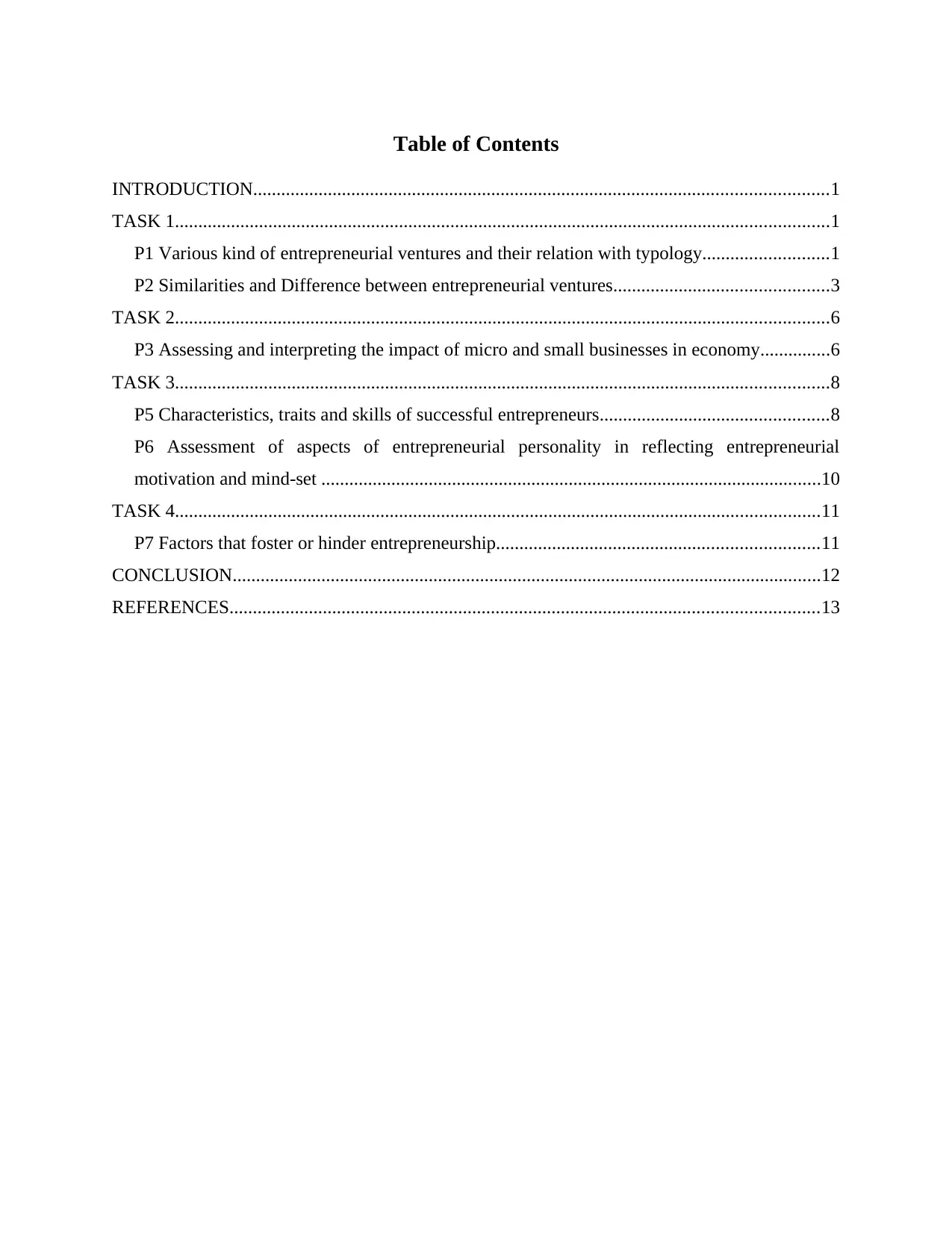
Table of Contents
INTRODUCTION...........................................................................................................................1
TASK 1............................................................................................................................................1
P1 Various kind of entrepreneurial ventures and their relation with typology...........................1
P2 Similarities and Difference between entrepreneurial ventures..............................................3
TASK 2............................................................................................................................................6
P3 Assessing and interpreting the impact of micro and small businesses in economy...............6
TASK 3............................................................................................................................................8
P5 Characteristics, traits and skills of successful entrepreneurs.................................................8
P6 Assessment of aspects of entrepreneurial personality in reflecting entrepreneurial
motivation and mind-set ...........................................................................................................10
TASK 4..........................................................................................................................................11
P7 Factors that foster or hinder entrepreneurship.....................................................................11
CONCLUSION..............................................................................................................................12
REFERENCES..............................................................................................................................13
INTRODUCTION...........................................................................................................................1
TASK 1............................................................................................................................................1
P1 Various kind of entrepreneurial ventures and their relation with typology...........................1
P2 Similarities and Difference between entrepreneurial ventures..............................................3
TASK 2............................................................................................................................................6
P3 Assessing and interpreting the impact of micro and small businesses in economy...............6
TASK 3............................................................................................................................................8
P5 Characteristics, traits and skills of successful entrepreneurs.................................................8
P6 Assessment of aspects of entrepreneurial personality in reflecting entrepreneurial
motivation and mind-set ...........................................................................................................10
TASK 4..........................................................................................................................................11
P7 Factors that foster or hinder entrepreneurship.....................................................................11
CONCLUSION..............................................................................................................................12
REFERENCES..............................................................................................................................13

⊘ This is a preview!⊘
Do you want full access?
Subscribe today to unlock all pages.

Trusted by 1+ million students worldwide
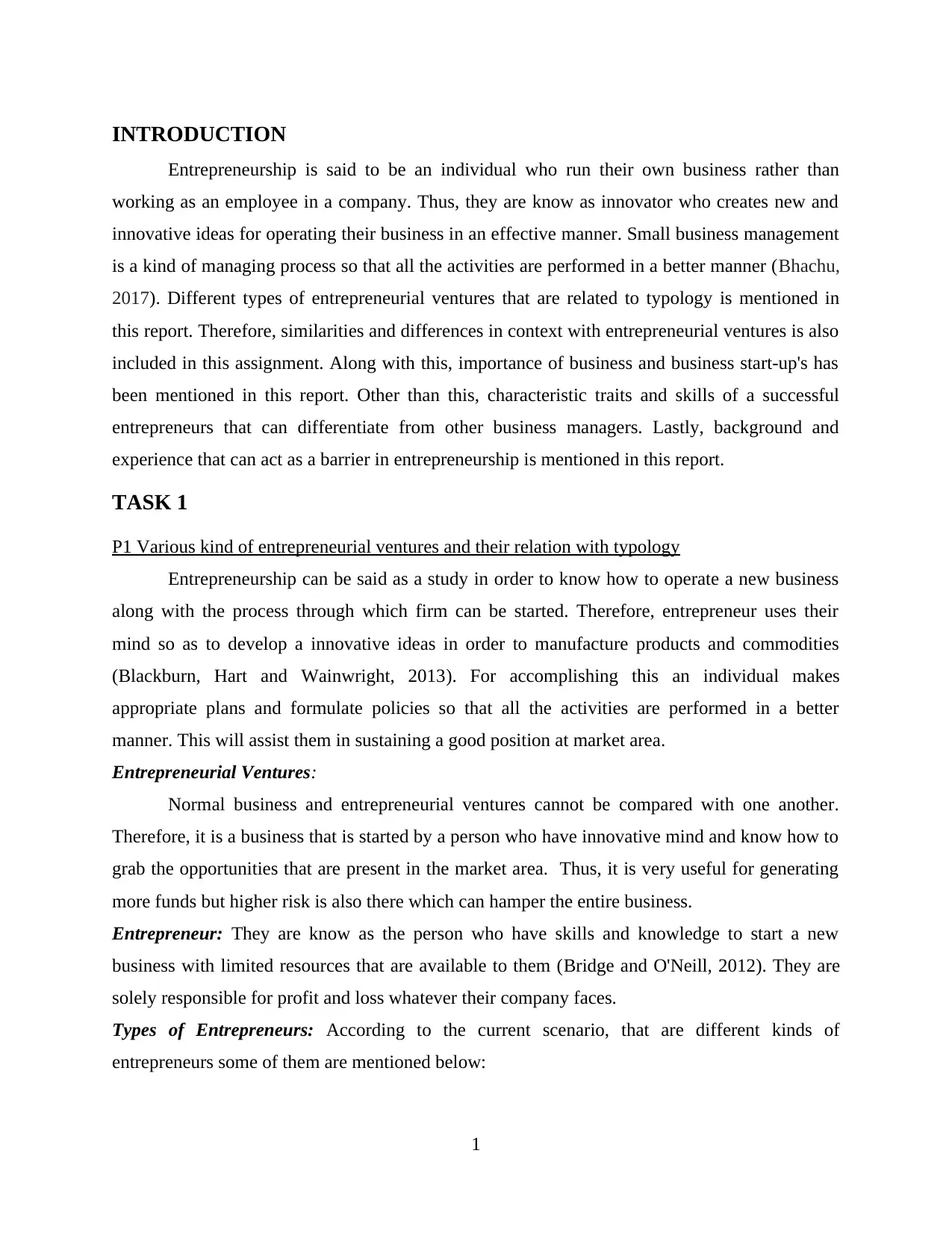
INTRODUCTION
Entrepreneurship is said to be an individual who run their own business rather than
working as an employee in a company. Thus, they are know as innovator who creates new and
innovative ideas for operating their business in an effective manner. Small business management
is a kind of managing process so that all the activities are performed in a better manner (Bhachu,
2017). Different types of entrepreneurial ventures that are related to typology is mentioned in
this report. Therefore, similarities and differences in context with entrepreneurial ventures is also
included in this assignment. Along with this, importance of business and business start-up's has
been mentioned in this report. Other than this, characteristic traits and skills of a successful
entrepreneurs that can differentiate from other business managers. Lastly, background and
experience that can act as a barrier in entrepreneurship is mentioned in this report.
TASK 1
P1 Various kind of entrepreneurial ventures and their relation with typology
Entrepreneurship can be said as a study in order to know how to operate a new business
along with the process through which firm can be started. Therefore, entrepreneur uses their
mind so as to develop a innovative ideas in order to manufacture products and commodities
(Blackburn, Hart and Wainwright, 2013). For accomplishing this an individual makes
appropriate plans and formulate policies so that all the activities are performed in a better
manner. This will assist them in sustaining a good position at market area.
Entrepreneurial Ventures:
Normal business and entrepreneurial ventures cannot be compared with one another.
Therefore, it is a business that is started by a person who have innovative mind and know how to
grab the opportunities that are present in the market area. Thus, it is very useful for generating
more funds but higher risk is also there which can hamper the entire business.
Entrepreneur: They are know as the person who have skills and knowledge to start a new
business with limited resources that are available to them (Bridge and O'Neill, 2012). They are
solely responsible for profit and loss whatever their company faces.
Types of Entrepreneurs: According to the current scenario, that are different kinds of
entrepreneurs some of them are mentioned below:
1
Entrepreneurship is said to be an individual who run their own business rather than
working as an employee in a company. Thus, they are know as innovator who creates new and
innovative ideas for operating their business in an effective manner. Small business management
is a kind of managing process so that all the activities are performed in a better manner (Bhachu,
2017). Different types of entrepreneurial ventures that are related to typology is mentioned in
this report. Therefore, similarities and differences in context with entrepreneurial ventures is also
included in this assignment. Along with this, importance of business and business start-up's has
been mentioned in this report. Other than this, characteristic traits and skills of a successful
entrepreneurs that can differentiate from other business managers. Lastly, background and
experience that can act as a barrier in entrepreneurship is mentioned in this report.
TASK 1
P1 Various kind of entrepreneurial ventures and their relation with typology
Entrepreneurship can be said as a study in order to know how to operate a new business
along with the process through which firm can be started. Therefore, entrepreneur uses their
mind so as to develop a innovative ideas in order to manufacture products and commodities
(Blackburn, Hart and Wainwright, 2013). For accomplishing this an individual makes
appropriate plans and formulate policies so that all the activities are performed in a better
manner. This will assist them in sustaining a good position at market area.
Entrepreneurial Ventures:
Normal business and entrepreneurial ventures cannot be compared with one another.
Therefore, it is a business that is started by a person who have innovative mind and know how to
grab the opportunities that are present in the market area. Thus, it is very useful for generating
more funds but higher risk is also there which can hamper the entire business.
Entrepreneur: They are know as the person who have skills and knowledge to start a new
business with limited resources that are available to them (Bridge and O'Neill, 2012). They are
solely responsible for profit and loss whatever their company faces.
Types of Entrepreneurs: According to the current scenario, that are different kinds of
entrepreneurs some of them are mentioned below:
1
Paraphrase This Document
Need a fresh take? Get an instant paraphrase of this document with our AI Paraphraser
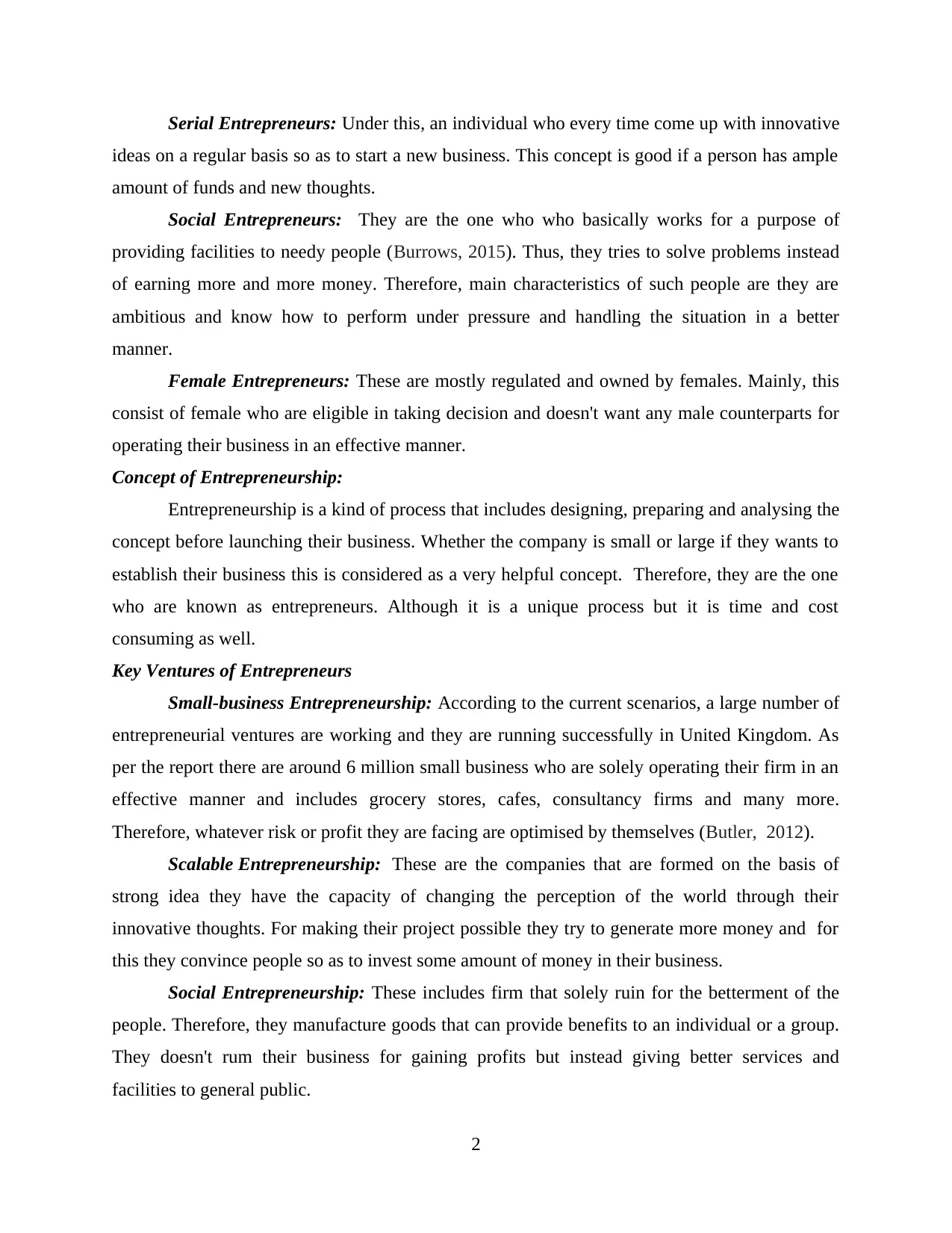
Serial Entrepreneurs: Under this, an individual who every time come up with innovative
ideas on a regular basis so as to start a new business. This concept is good if a person has ample
amount of funds and new thoughts.
Social Entrepreneurs: They are the one who who basically works for a purpose of
providing facilities to needy people (Burrows, 2015). Thus, they tries to solve problems instead
of earning more and more money. Therefore, main characteristics of such people are they are
ambitious and know how to perform under pressure and handling the situation in a better
manner.
Female Entrepreneurs: These are mostly regulated and owned by females. Mainly, this
consist of female who are eligible in taking decision and doesn't want any male counterparts for
operating their business in an effective manner.
Concept of Entrepreneurship:
Entrepreneurship is a kind of process that includes designing, preparing and analysing the
concept before launching their business. Whether the company is small or large if they wants to
establish their business this is considered as a very helpful concept. Therefore, they are the one
who are known as entrepreneurs. Although it is a unique process but it is time and cost
consuming as well.
Key Ventures of Entrepreneurs
Small-business Entrepreneurship: According to the current scenarios, a large number of
entrepreneurial ventures are working and they are running successfully in United Kingdom. As
per the report there are around 6 million small business who are solely operating their firm in an
effective manner and includes grocery stores, cafes, consultancy firms and many more.
Therefore, whatever risk or profit they are facing are optimised by themselves (Butler, 2012).
Scalable Entrepreneurship: These are the companies that are formed on the basis of
strong idea they have the capacity of changing the perception of the world through their
innovative thoughts. For making their project possible they try to generate more money and for
this they convince people so as to invest some amount of money in their business.
Social Entrepreneurship: These includes firm that solely ruin for the betterment of the
people. Therefore, they manufacture goods that can provide benefits to an individual or a group.
They doesn't rum their business for gaining profits but instead giving better services and
facilities to general public.
2
ideas on a regular basis so as to start a new business. This concept is good if a person has ample
amount of funds and new thoughts.
Social Entrepreneurs: They are the one who who basically works for a purpose of
providing facilities to needy people (Burrows, 2015). Thus, they tries to solve problems instead
of earning more and more money. Therefore, main characteristics of such people are they are
ambitious and know how to perform under pressure and handling the situation in a better
manner.
Female Entrepreneurs: These are mostly regulated and owned by females. Mainly, this
consist of female who are eligible in taking decision and doesn't want any male counterparts for
operating their business in an effective manner.
Concept of Entrepreneurship:
Entrepreneurship is a kind of process that includes designing, preparing and analysing the
concept before launching their business. Whether the company is small or large if they wants to
establish their business this is considered as a very helpful concept. Therefore, they are the one
who are known as entrepreneurs. Although it is a unique process but it is time and cost
consuming as well.
Key Ventures of Entrepreneurs
Small-business Entrepreneurship: According to the current scenarios, a large number of
entrepreneurial ventures are working and they are running successfully in United Kingdom. As
per the report there are around 6 million small business who are solely operating their firm in an
effective manner and includes grocery stores, cafes, consultancy firms and many more.
Therefore, whatever risk or profit they are facing are optimised by themselves (Butler, 2012).
Scalable Entrepreneurship: These are the companies that are formed on the basis of
strong idea they have the capacity of changing the perception of the world through their
innovative thoughts. For making their project possible they try to generate more money and for
this they convince people so as to invest some amount of money in their business.
Social Entrepreneurship: These includes firm that solely ruin for the betterment of the
people. Therefore, they manufacture goods that can provide benefits to an individual or a group.
They doesn't rum their business for gaining profits but instead giving better services and
facilities to general public.
2
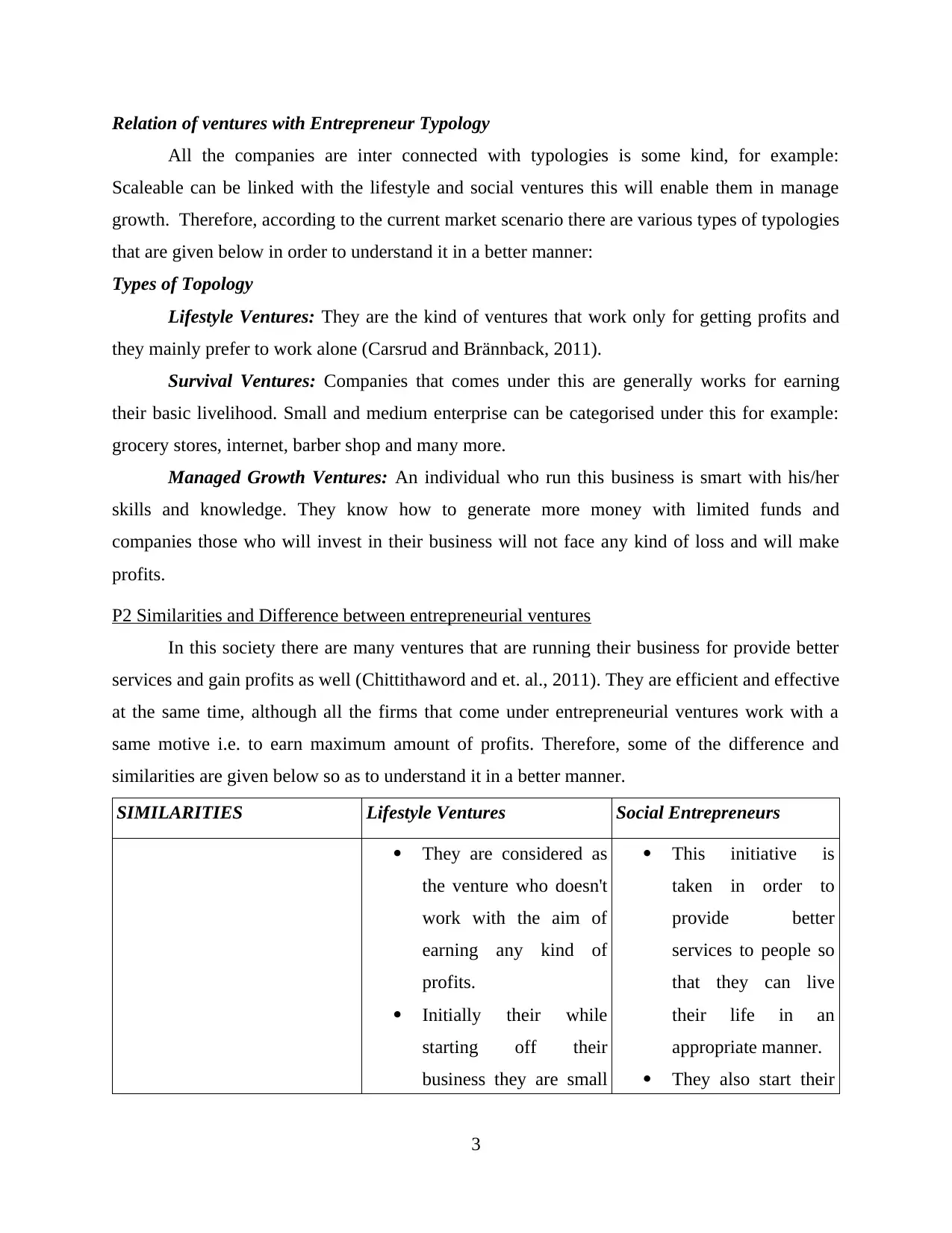
Relation of ventures with Entrepreneur Typology
All the companies are inter connected with typologies is some kind, for example:
Scaleable can be linked with the lifestyle and social ventures this will enable them in manage
growth. Therefore, according to the current market scenario there are various types of typologies
that are given below in order to understand it in a better manner:
Types of Topology
Lifestyle Ventures: They are the kind of ventures that work only for getting profits and
they mainly prefer to work alone (Carsrud and Brännback, 2011).
Survival Ventures: Companies that comes under this are generally works for earning
their basic livelihood. Small and medium enterprise can be categorised under this for example:
grocery stores, internet, barber shop and many more.
Managed Growth Ventures: An individual who run this business is smart with his/her
skills and knowledge. They know how to generate more money with limited funds and
companies those who will invest in their business will not face any kind of loss and will make
profits.
P2 Similarities and Difference between entrepreneurial ventures
In this society there are many ventures that are running their business for provide better
services and gain profits as well (Chittithaword and et. al., 2011). They are efficient and effective
at the same time, although all the firms that come under entrepreneurial ventures work with a
same motive i.e. to earn maximum amount of profits. Therefore, some of the difference and
similarities are given below so as to understand it in a better manner.
SIMILARITIES Lifestyle Ventures Social Entrepreneurs
They are considered as
the venture who doesn't
work with the aim of
earning any kind of
profits.
Initially their while
starting off their
business they are small
This initiative is
taken in order to
provide better
services to people so
that they can live
their life in an
appropriate manner.
They also start their
3
All the companies are inter connected with typologies is some kind, for example:
Scaleable can be linked with the lifestyle and social ventures this will enable them in manage
growth. Therefore, according to the current market scenario there are various types of typologies
that are given below in order to understand it in a better manner:
Types of Topology
Lifestyle Ventures: They are the kind of ventures that work only for getting profits and
they mainly prefer to work alone (Carsrud and Brännback, 2011).
Survival Ventures: Companies that comes under this are generally works for earning
their basic livelihood. Small and medium enterprise can be categorised under this for example:
grocery stores, internet, barber shop and many more.
Managed Growth Ventures: An individual who run this business is smart with his/her
skills and knowledge. They know how to generate more money with limited funds and
companies those who will invest in their business will not face any kind of loss and will make
profits.
P2 Similarities and Difference between entrepreneurial ventures
In this society there are many ventures that are running their business for provide better
services and gain profits as well (Chittithaword and et. al., 2011). They are efficient and effective
at the same time, although all the firms that come under entrepreneurial ventures work with a
same motive i.e. to earn maximum amount of profits. Therefore, some of the difference and
similarities are given below so as to understand it in a better manner.
SIMILARITIES Lifestyle Ventures Social Entrepreneurs
They are considered as
the venture who doesn't
work with the aim of
earning any kind of
profits.
Initially their while
starting off their
business they are small
This initiative is
taken in order to
provide better
services to people so
that they can live
their life in an
appropriate manner.
They also start their
3
⊘ This is a preview!⊘
Do you want full access?
Subscribe today to unlock all pages.

Trusted by 1+ million students worldwide
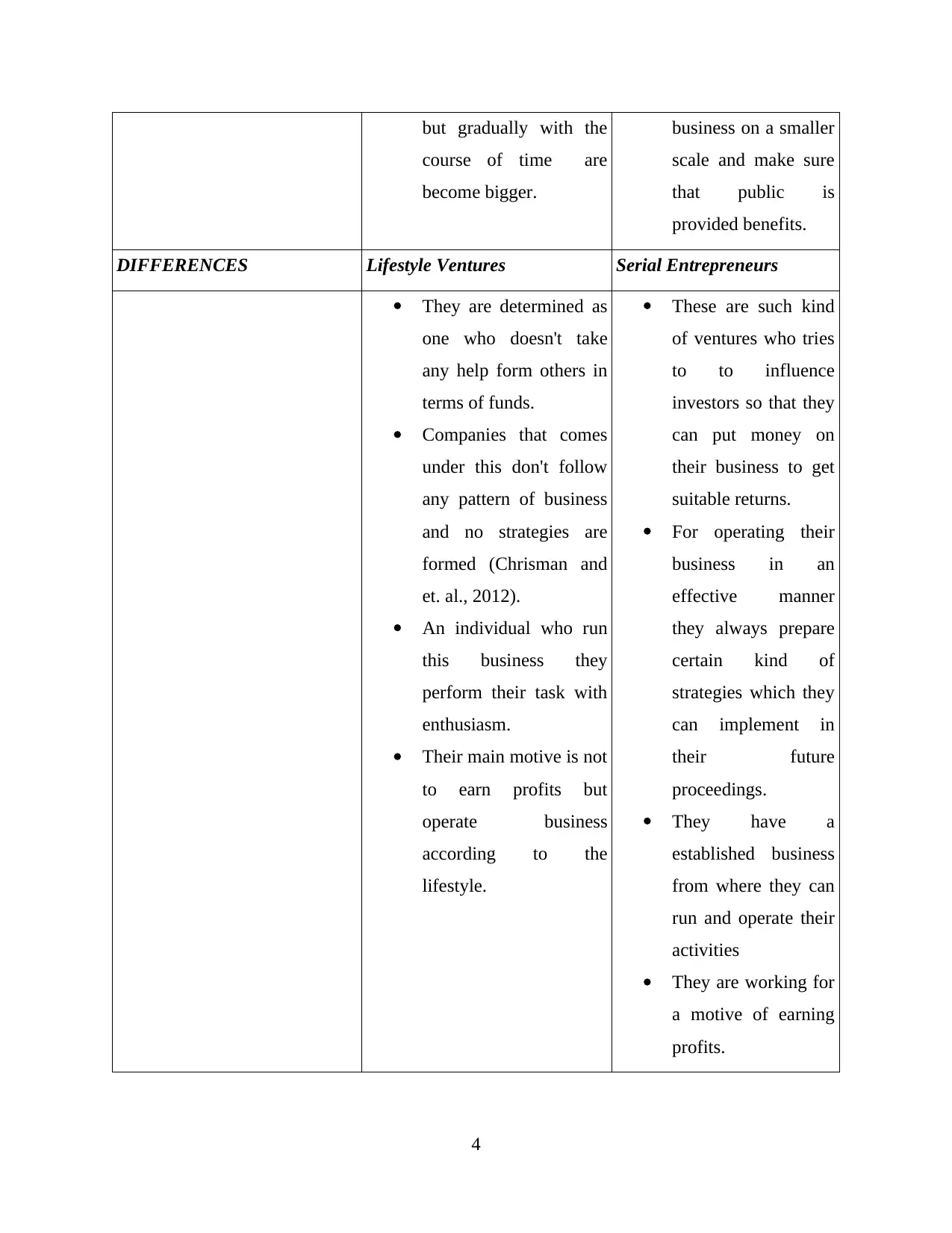
but gradually with the
course of time are
become bigger.
business on a smaller
scale and make sure
that public is
provided benefits.
DIFFERENCES Lifestyle Ventures Serial Entrepreneurs
They are determined as
one who doesn't take
any help form others in
terms of funds.
Companies that comes
under this don't follow
any pattern of business
and no strategies are
formed (Chrisman and
et. al., 2012).
An individual who run
this business they
perform their task with
enthusiasm.
Their main motive is not
to earn profits but
operate business
according to the
lifestyle.
These are such kind
of ventures who tries
to to influence
investors so that they
can put money on
their business to get
suitable returns.
For operating their
business in an
effective manner
they always prepare
certain kind of
strategies which they
can implement in
their future
proceedings.
They have a
established business
from where they can
run and operate their
activities
They are working for
a motive of earning
profits.
4
course of time are
become bigger.
business on a smaller
scale and make sure
that public is
provided benefits.
DIFFERENCES Lifestyle Ventures Serial Entrepreneurs
They are determined as
one who doesn't take
any help form others in
terms of funds.
Companies that comes
under this don't follow
any pattern of business
and no strategies are
formed (Chrisman and
et. al., 2012).
An individual who run
this business they
perform their task with
enthusiasm.
Their main motive is not
to earn profits but
operate business
according to the
lifestyle.
These are such kind
of ventures who tries
to to influence
investors so that they
can put money on
their business to get
suitable returns.
For operating their
business in an
effective manner
they always prepare
certain kind of
strategies which they
can implement in
their future
proceedings.
They have a
established business
from where they can
run and operate their
activities
They are working for
a motive of earning
profits.
4
Paraphrase This Document
Need a fresh take? Get an instant paraphrase of this document with our AI Paraphraser
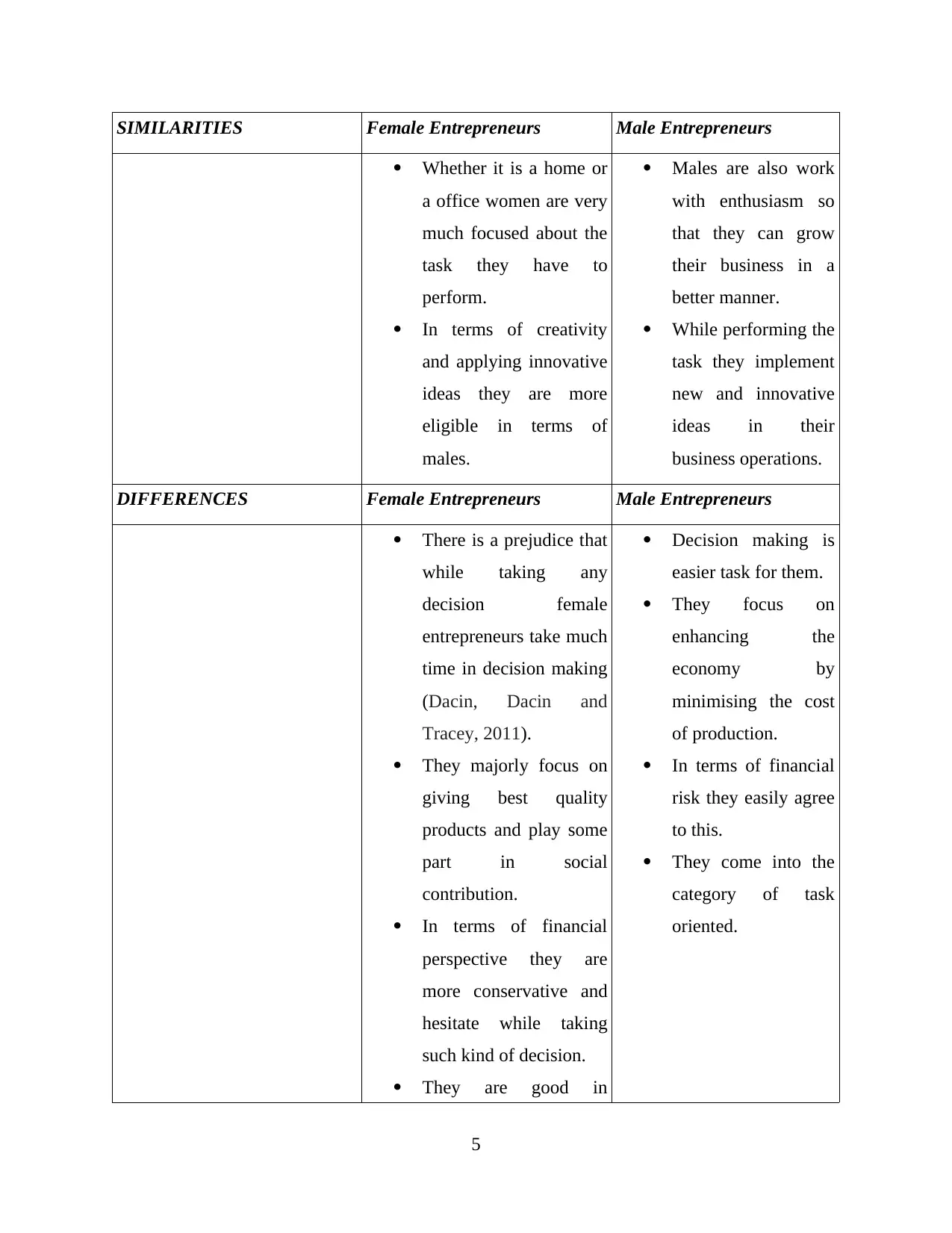
SIMILARITIES Female Entrepreneurs Male Entrepreneurs
Whether it is a home or
a office women are very
much focused about the
task they have to
perform.
In terms of creativity
and applying innovative
ideas they are more
eligible in terms of
males.
Males are also work
with enthusiasm so
that they can grow
their business in a
better manner.
While performing the
task they implement
new and innovative
ideas in their
business operations.
DIFFERENCES Female Entrepreneurs Male Entrepreneurs
There is a prejudice that
while taking any
decision female
entrepreneurs take much
time in decision making
(Dacin, Dacin and
Tracey, 2011).
They majorly focus on
giving best quality
products and play some
part in social
contribution.
In terms of financial
perspective they are
more conservative and
hesitate while taking
such kind of decision.
They are good in
Decision making is
easier task for them.
They focus on
enhancing the
economy by
minimising the cost
of production.
In terms of financial
risk they easily agree
to this.
They come into the
category of task
oriented.
5
Whether it is a home or
a office women are very
much focused about the
task they have to
perform.
In terms of creativity
and applying innovative
ideas they are more
eligible in terms of
males.
Males are also work
with enthusiasm so
that they can grow
their business in a
better manner.
While performing the
task they implement
new and innovative
ideas in their
business operations.
DIFFERENCES Female Entrepreneurs Male Entrepreneurs
There is a prejudice that
while taking any
decision female
entrepreneurs take much
time in decision making
(Dacin, Dacin and
Tracey, 2011).
They majorly focus on
giving best quality
products and play some
part in social
contribution.
In terms of financial
perspective they are
more conservative and
hesitate while taking
such kind of decision.
They are good in
Decision making is
easier task for them.
They focus on
enhancing the
economy by
minimising the cost
of production.
In terms of financial
risk they easily agree
to this.
They come into the
category of task
oriented.
5
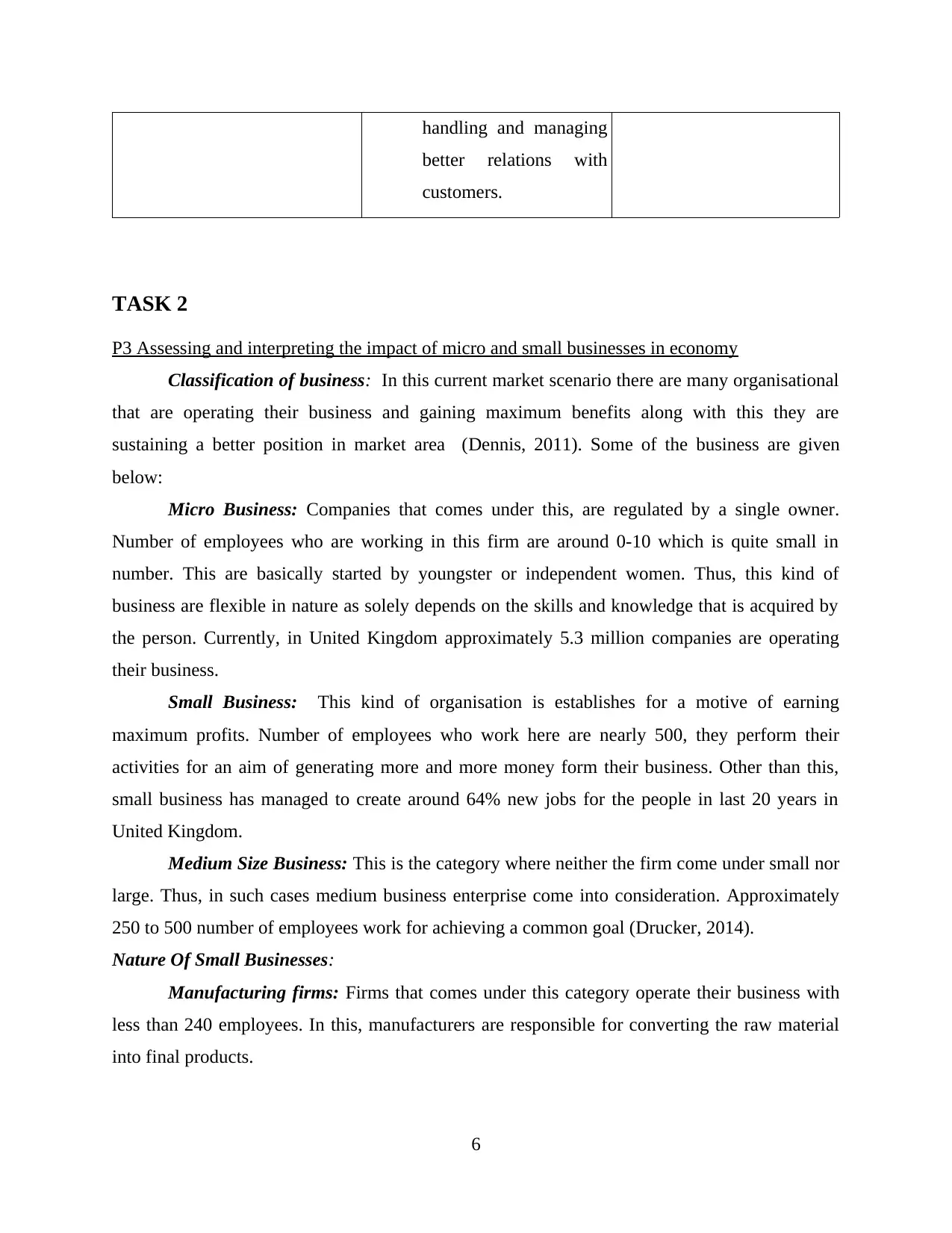
handling and managing
better relations with
customers.
TASK 2
P3 Assessing and interpreting the impact of micro and small businesses in economy
Classification of business: In this current market scenario there are many organisational
that are operating their business and gaining maximum benefits along with this they are
sustaining a better position in market area (Dennis, 2011). Some of the business are given
below:
Micro Business: Companies that comes under this, are regulated by a single owner.
Number of employees who are working in this firm are around 0-10 which is quite small in
number. This are basically started by youngster or independent women. Thus, this kind of
business are flexible in nature as solely depends on the skills and knowledge that is acquired by
the person. Currently, in United Kingdom approximately 5.3 million companies are operating
their business.
Small Business: This kind of organisation is establishes for a motive of earning
maximum profits. Number of employees who work here are nearly 500, they perform their
activities for an aim of generating more and more money form their business. Other than this,
small business has managed to create around 64% new jobs for the people in last 20 years in
United Kingdom.
Medium Size Business: This is the category where neither the firm come under small nor
large. Thus, in such cases medium business enterprise come into consideration. Approximately
250 to 500 number of employees work for achieving a common goal (Drucker, 2014).
Nature Of Small Businesses:
Manufacturing firms: Firms that comes under this category operate their business with
less than 240 employees. In this, manufacturers are responsible for converting the raw material
into final products.
6
better relations with
customers.
TASK 2
P3 Assessing and interpreting the impact of micro and small businesses in economy
Classification of business: In this current market scenario there are many organisational
that are operating their business and gaining maximum benefits along with this they are
sustaining a better position in market area (Dennis, 2011). Some of the business are given
below:
Micro Business: Companies that comes under this, are regulated by a single owner.
Number of employees who are working in this firm are around 0-10 which is quite small in
number. This are basically started by youngster or independent women. Thus, this kind of
business are flexible in nature as solely depends on the skills and knowledge that is acquired by
the person. Currently, in United Kingdom approximately 5.3 million companies are operating
their business.
Small Business: This kind of organisation is establishes for a motive of earning
maximum profits. Number of employees who work here are nearly 500, they perform their
activities for an aim of generating more and more money form their business. Other than this,
small business has managed to create around 64% new jobs for the people in last 20 years in
United Kingdom.
Medium Size Business: This is the category where neither the firm come under small nor
large. Thus, in such cases medium business enterprise come into consideration. Approximately
250 to 500 number of employees work for achieving a common goal (Drucker, 2014).
Nature Of Small Businesses:
Manufacturing firms: Firms that comes under this category operate their business with
less than 240 employees. In this, manufacturers are responsible for converting the raw material
into final products.
6
⊘ This is a preview!⊘
Do you want full access?
Subscribe today to unlock all pages.

Trusted by 1+ million students worldwide
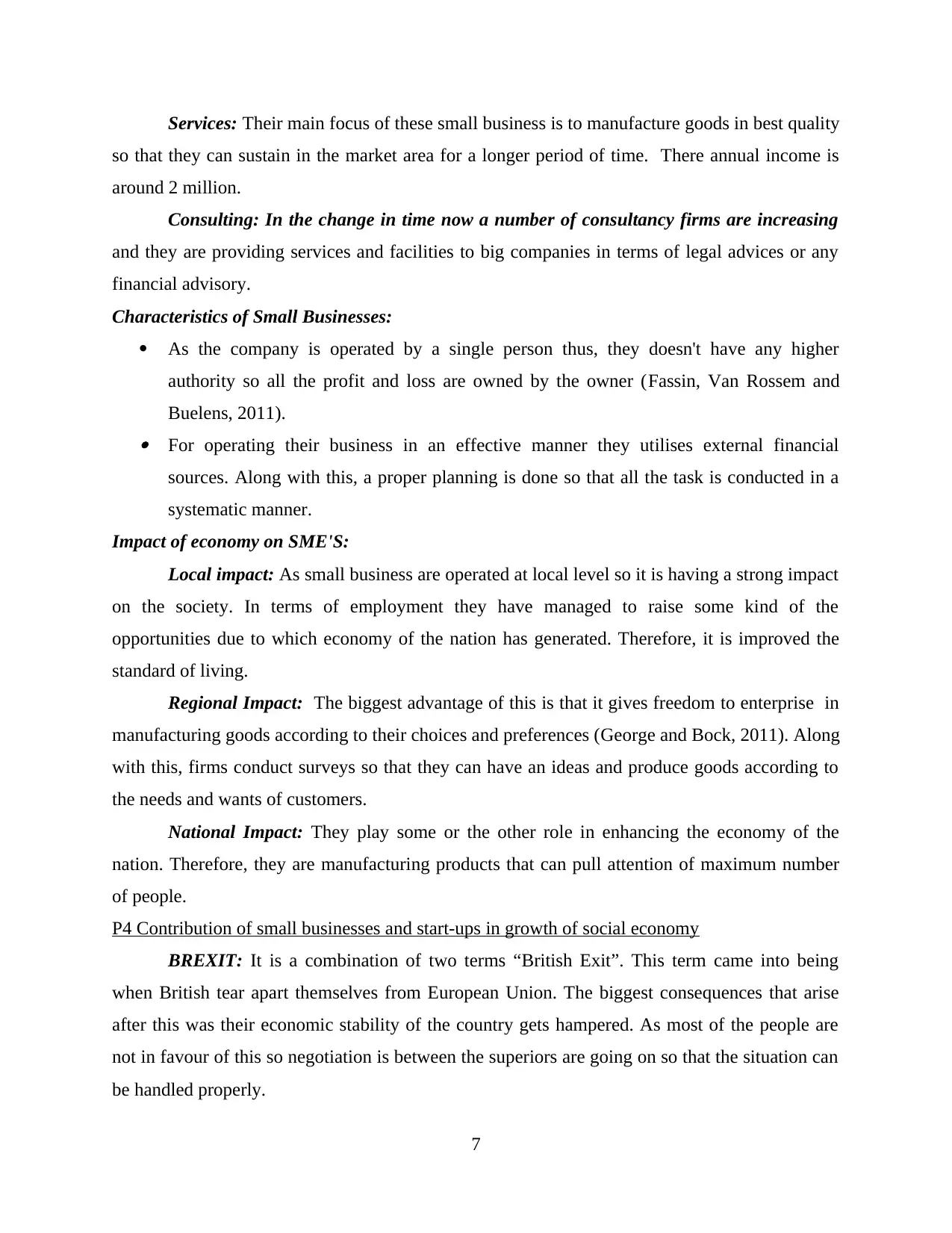
Services: Their main focus of these small business is to manufacture goods in best quality
so that they can sustain in the market area for a longer period of time. There annual income is
around 2 million.
Consulting: In the change in time now a number of consultancy firms are increasing
and they are providing services and facilities to big companies in terms of legal advices or any
financial advisory.
Characteristics of Small Businesses:
As the company is operated by a single person thus, they doesn't have any higher
authority so all the profit and loss are owned by the owner (Fassin, Van Rossem and
Buelens, 2011). For operating their business in an effective manner they utilises external financial
sources. Along with this, a proper planning is done so that all the task is conducted in a
systematic manner.
Impact of economy on SME'S:
Local impact: As small business are operated at local level so it is having a strong impact
on the society. In terms of employment they have managed to raise some kind of the
opportunities due to which economy of the nation has generated. Therefore, it is improved the
standard of living.
Regional Impact: The biggest advantage of this is that it gives freedom to enterprise in
manufacturing goods according to their choices and preferences (George and Bock, 2011). Along
with this, firms conduct surveys so that they can have an ideas and produce goods according to
the needs and wants of customers.
National Impact: They play some or the other role in enhancing the economy of the
nation. Therefore, they are manufacturing products that can pull attention of maximum number
of people.
P4 Contribution of small businesses and start-ups in growth of social economy
BREXIT: It is a combination of two terms “British Exit”. This term came into being
when British tear apart themselves from European Union. The biggest consequences that arise
after this was their economic stability of the country gets hampered. As most of the people are
not in favour of this so negotiation is between the superiors are going on so that the situation can
be handled properly.
7
so that they can sustain in the market area for a longer period of time. There annual income is
around 2 million.
Consulting: In the change in time now a number of consultancy firms are increasing
and they are providing services and facilities to big companies in terms of legal advices or any
financial advisory.
Characteristics of Small Businesses:
As the company is operated by a single person thus, they doesn't have any higher
authority so all the profit and loss are owned by the owner (Fassin, Van Rossem and
Buelens, 2011). For operating their business in an effective manner they utilises external financial
sources. Along with this, a proper planning is done so that all the task is conducted in a
systematic manner.
Impact of economy on SME'S:
Local impact: As small business are operated at local level so it is having a strong impact
on the society. In terms of employment they have managed to raise some kind of the
opportunities due to which economy of the nation has generated. Therefore, it is improved the
standard of living.
Regional Impact: The biggest advantage of this is that it gives freedom to enterprise in
manufacturing goods according to their choices and preferences (George and Bock, 2011). Along
with this, firms conduct surveys so that they can have an ideas and produce goods according to
the needs and wants of customers.
National Impact: They play some or the other role in enhancing the economy of the
nation. Therefore, they are manufacturing products that can pull attention of maximum number
of people.
P4 Contribution of small businesses and start-ups in growth of social economy
BREXIT: It is a combination of two terms “British Exit”. This term came into being
when British tear apart themselves from European Union. The biggest consequences that arise
after this was their economic stability of the country gets hampered. As most of the people are
not in favour of this so negotiation is between the superiors are going on so that the situation can
be handled properly.
7
Paraphrase This Document
Need a fresh take? Get an instant paraphrase of this document with our AI Paraphraser
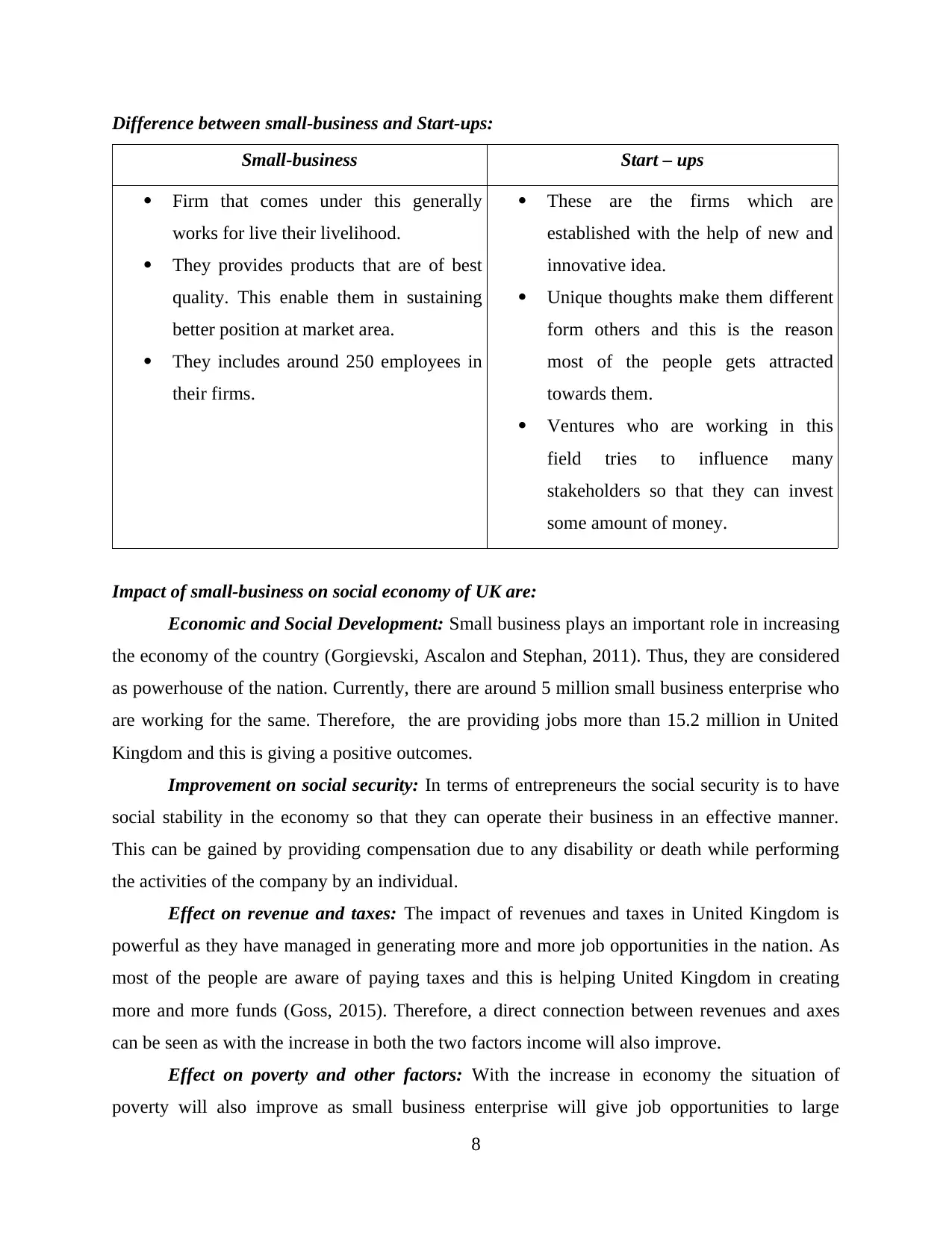
Difference between small-business and Start-ups:
Small-business Start – ups
Firm that comes under this generally
works for live their livelihood.
They provides products that are of best
quality. This enable them in sustaining
better position at market area.
They includes around 250 employees in
their firms.
These are the firms which are
established with the help of new and
innovative idea.
Unique thoughts make them different
form others and this is the reason
most of the people gets attracted
towards them.
Ventures who are working in this
field tries to influence many
stakeholders so that they can invest
some amount of money.
Impact of small-business on social economy of UK are:
Economic and Social Development: Small business plays an important role in increasing
the economy of the country (Gorgievski, Ascalon and Stephan, 2011). Thus, they are considered
as powerhouse of the nation. Currently, there are around 5 million small business enterprise who
are working for the same. Therefore, the are providing jobs more than 15.2 million in United
Kingdom and this is giving a positive outcomes.
Improvement on social security: In terms of entrepreneurs the social security is to have
social stability in the economy so that they can operate their business in an effective manner.
This can be gained by providing compensation due to any disability or death while performing
the activities of the company by an individual.
Effect on revenue and taxes: The impact of revenues and taxes in United Kingdom is
powerful as they have managed in generating more and more job opportunities in the nation. As
most of the people are aware of paying taxes and this is helping United Kingdom in creating
more and more funds (Goss, 2015). Therefore, a direct connection between revenues and axes
can be seen as with the increase in both the two factors income will also improve.
Effect on poverty and other factors: With the increase in economy the situation of
poverty will also improve as small business enterprise will give job opportunities to large
8
Small-business Start – ups
Firm that comes under this generally
works for live their livelihood.
They provides products that are of best
quality. This enable them in sustaining
better position at market area.
They includes around 250 employees in
their firms.
These are the firms which are
established with the help of new and
innovative idea.
Unique thoughts make them different
form others and this is the reason
most of the people gets attracted
towards them.
Ventures who are working in this
field tries to influence many
stakeholders so that they can invest
some amount of money.
Impact of small-business on social economy of UK are:
Economic and Social Development: Small business plays an important role in increasing
the economy of the country (Gorgievski, Ascalon and Stephan, 2011). Thus, they are considered
as powerhouse of the nation. Currently, there are around 5 million small business enterprise who
are working for the same. Therefore, the are providing jobs more than 15.2 million in United
Kingdom and this is giving a positive outcomes.
Improvement on social security: In terms of entrepreneurs the social security is to have
social stability in the economy so that they can operate their business in an effective manner.
This can be gained by providing compensation due to any disability or death while performing
the activities of the company by an individual.
Effect on revenue and taxes: The impact of revenues and taxes in United Kingdom is
powerful as they have managed in generating more and more job opportunities in the nation. As
most of the people are aware of paying taxes and this is helping United Kingdom in creating
more and more funds (Goss, 2015). Therefore, a direct connection between revenues and axes
can be seen as with the increase in both the two factors income will also improve.
Effect on poverty and other factors: With the increase in economy the situation of
poverty will also improve as small business enterprise will give job opportunities to large
8
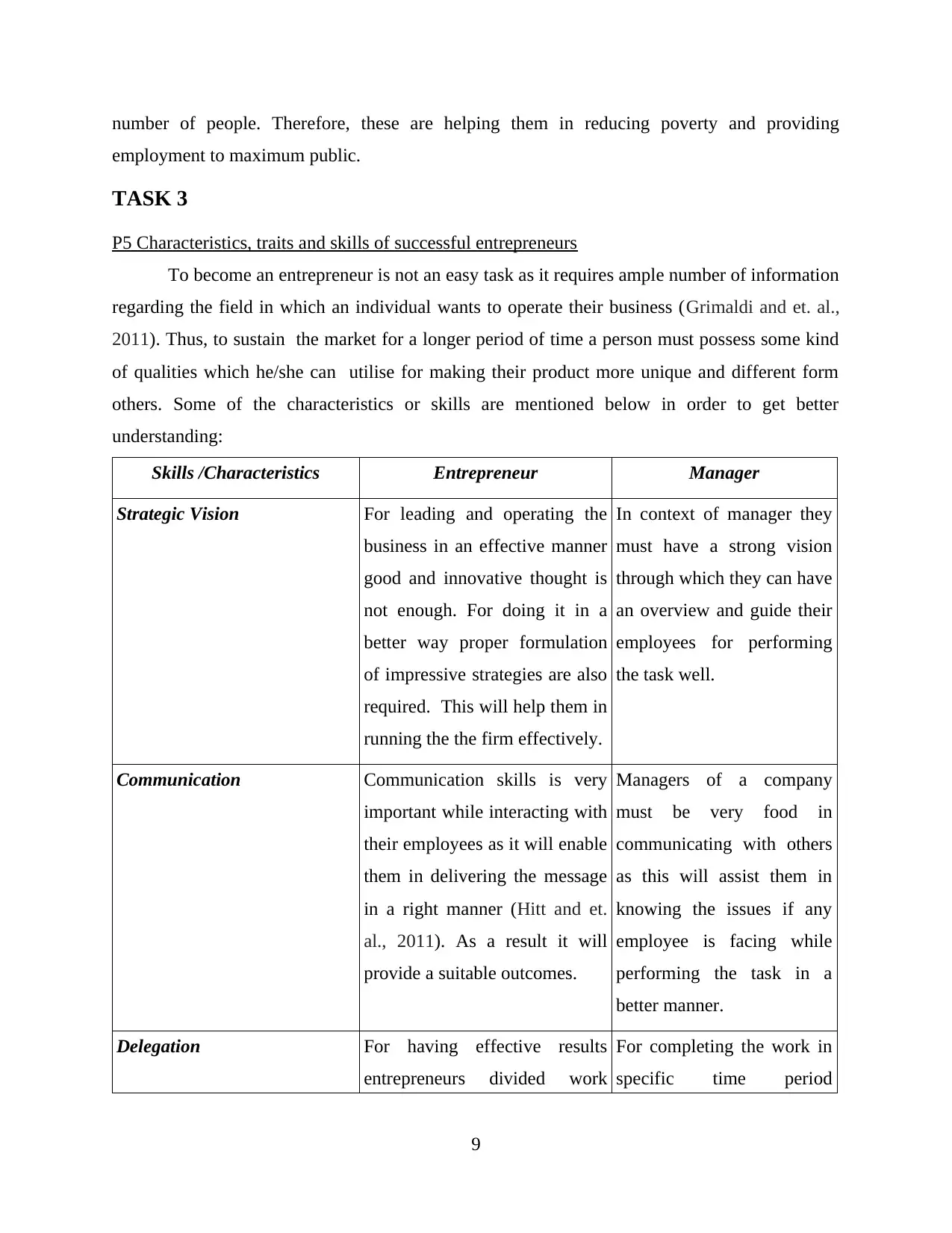
number of people. Therefore, these are helping them in reducing poverty and providing
employment to maximum public.
TASK 3
P5 Characteristics, traits and skills of successful entrepreneurs
To become an entrepreneur is not an easy task as it requires ample number of information
regarding the field in which an individual wants to operate their business (Grimaldi and et. al.,
2011). Thus, to sustain the market for a longer period of time a person must possess some kind
of qualities which he/she can utilise for making their product more unique and different form
others. Some of the characteristics or skills are mentioned below in order to get better
understanding:
Skills /Characteristics Entrepreneur Manager
Strategic Vision For leading and operating the
business in an effective manner
good and innovative thought is
not enough. For doing it in a
better way proper formulation
of impressive strategies are also
required. This will help them in
running the the firm effectively.
In context of manager they
must have a strong vision
through which they can have
an overview and guide their
employees for performing
the task well.
Communication Communication skills is very
important while interacting with
their employees as it will enable
them in delivering the message
in a right manner (Hitt and et.
al., 2011). As a result it will
provide a suitable outcomes.
Managers of a company
must be very food in
communicating with others
as this will assist them in
knowing the issues if any
employee is facing while
performing the task in a
better manner.
Delegation For having effective results
entrepreneurs divided work
For completing the work in
specific time period
9
employment to maximum public.
TASK 3
P5 Characteristics, traits and skills of successful entrepreneurs
To become an entrepreneur is not an easy task as it requires ample number of information
regarding the field in which an individual wants to operate their business (Grimaldi and et. al.,
2011). Thus, to sustain the market for a longer period of time a person must possess some kind
of qualities which he/she can utilise for making their product more unique and different form
others. Some of the characteristics or skills are mentioned below in order to get better
understanding:
Skills /Characteristics Entrepreneur Manager
Strategic Vision For leading and operating the
business in an effective manner
good and innovative thought is
not enough. For doing it in a
better way proper formulation
of impressive strategies are also
required. This will help them in
running the the firm effectively.
In context of manager they
must have a strong vision
through which they can have
an overview and guide their
employees for performing
the task well.
Communication Communication skills is very
important while interacting with
their employees as it will enable
them in delivering the message
in a right manner (Hitt and et.
al., 2011). As a result it will
provide a suitable outcomes.
Managers of a company
must be very food in
communicating with others
as this will assist them in
knowing the issues if any
employee is facing while
performing the task in a
better manner.
Delegation For having effective results
entrepreneurs divided work
For completing the work in
specific time period
9
⊘ This is a preview!⊘
Do you want full access?
Subscribe today to unlock all pages.

Trusted by 1+ million students worldwide
1 out of 17
Related Documents
Your All-in-One AI-Powered Toolkit for Academic Success.
+13062052269
info@desklib.com
Available 24*7 on WhatsApp / Email
![[object Object]](/_next/static/media/star-bottom.7253800d.svg)
Unlock your academic potential
Copyright © 2020–2025 A2Z Services. All Rights Reserved. Developed and managed by ZUCOL.





